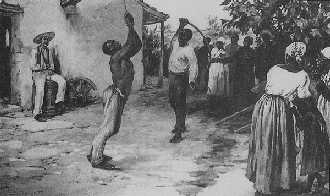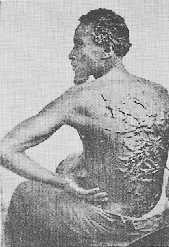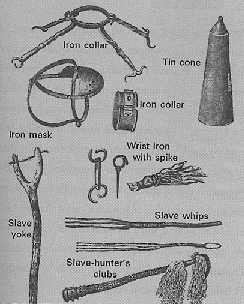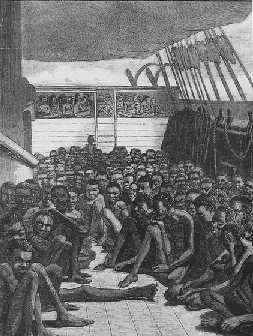White Woman Embraces Black Reparations
by Marie Roberts
April/May 2001
Part Two
The Government Must Pay
 |
I believe the chief entity that must be held responsible for reparations to African Americans is the United States government. If the government hadn’t authorized and supported it through law, the crime of plantation slavery wouldn’t have been able to be committed here in the first place. And the government profited enormously from slavery as it collected taxes from plantation owners on the money they made from unpaid enslaved labor. Huge amounts of money poured in on the cotton industry alone.
It is also my opinion that since emancipation, the US government has essentially done everything in its power to maintain white supremacy and to obstruct the empowerment of African Americans. Every step toward greater justice to Black persons has been extremely hard won, to put it mildly. They’ve had to take to the streets, shed their blood, launch boycotts, wage court battles–literally fight tooth and nail on every front to gain even the slightest progress towards receiving what should have been rightfully theirs in the first place.
How Can The Government Pay?
This is a mere fraction of the ways our government could start drawing together a sizable fund to begin reparations. I am sure many other ways will be found as well.
Private Companies Examined
 |
As various African American activists for reparations are already doing, private estates, companies and industries which profited most from the unpaid labor of enslaved Africans could also be identified, and arrangements made wherever possible to collect restitution from them. This inquiry could take place within our borders and also reach far beyond, for there are many foreign companies–as well as governments of nations such as Portugal, Spain, England, and France–which participated in and benefitted enormously from the European slave trade.
This includes not only profits made directly from the actual trading in enslaved persons, but indirectly from all that enslaved labor created. Many early American industries were based on the cotton, sugar, rice, tobacco, and other products their labor produced. Railroads and shipping companies, the banking industry, and many other businesses made huge profits from the commerce generated by the output of enslaved labor as well.
Numerous industries that profited from the enslavement are already being uncovered. Take the insurance industry, for instance. Attorney Deadria Farmer-Paellman has researched Aetna Inc., the number one United States life and health insurer, and discovered that the profits Aetna made from their early policies taken out by owners on the lives of the enslaved formed the base for Aetna later to become a multibillion dollar corporation. She writes that these life insurance policies, issued in the 1850’s, “were one of the first lines of business underwritten by the Hartford, Connecticut-based insurer, which now has 47 million customers worldwide and annual revenues of $26 billion.” And she states, “They have a moral obligation to apologize and share that wealth with the heirs of the Africans they helped maintain in slavery.”
 |
Attorney Farmer-Paellman indicates, too, that her investigation has identified at least forty other US corporations which benefitted and are still benefitting from their unjust practices during slavery, including Fleet Bank and Brown University of Providence, RI.
I believe the British firm, Lloyds of London, could be looked at, too, for they also got their start and made an absolute fortune insuring slave ships. Then, of course, it would be pretty easy to find out what companies specialized in building ships specifically designed for this barbaric trade in “human cargo” and go after reparations from them as well. The possibilities of holding businesses accountable are endless.
Reparations and the Catholic Church
- So profitable was the European slave trade that the Roman Catholic Church entered the business as a grantor of commercial privilege to prevent Christian nations from engaging in fratricidal wars of access to the African Coast. Usually the Pope signed an agreement with a slaving nation which insured that nation’s right to a specific region of Africa. A fee was paid to the church for that asiento. Since no European nation exercised complete hegemony over others, the Church became–and remained for several hundred years–the primary moral sanctioner for the brutal institution of slave trading.
The Catholic Church was paid about $25 for each captured African, and in addition to paying (with interest) into a reparations fund, the millions they made in this way, it could be considered whether they–who ought to have been leading the fight against such atrocities instead of leading its organization–should pay even more in penance for the shocking immorality of their actions..
Companies Profiting Now
For example, taken together companies such as McDonald’s, Burger King, Kentucky Fried Chicken, and Wendy’s–and their stockholders–have made billions of dollars from the economic difficulty that many African Americans have found themselves in as a long-range result of slavery. This economic hardship has enabled these companies to employ (some say exploit) young African Americans at disgracefully low wages while also selling their inexpensive products to the African American community–often to the detriment of their health–because persons couldn’t afford to eat at higher-priced restaurants.
 |
As a beginning form of reparations, I would also like to see every big corporation doing business in African American communities–such as Disney, Starbucks, Old Navy, and Blockbuster Video which recently opened large stores in Harlem–required to develop partnerships with the communities so they actually do what they profess to do: put as much into the community as they take out. Though they claim to serve the community by creating badly needed jobs, in truth they don’t provide that many, and the jobs they do provide usually pay very little. It’s a sheer case of throwing around a few pennies to disguise the fact that they’re carting out big dollars–dollars that should be staying with the black-owned establishments they’re displacing. This hemorrhaging should be stopped through something in the field of reparations.
As a person who benefits daily in more ways than I even know from the iniquity of slavery and from the ensuing white privilege that continues to rule our nation today, I will always feel ashamed until the horrendous crime committed by my people has been redressed. I am more grateful than I can say to every person who began working as early as the mid 1860s to bring this about as well as to all those who continue the effort so persistently now. I say let the thought about reparations to African Americans go as far and wide as the crime itself. It will help cleanse America!
You can contact Marie Roberts at mrobertsusa@yahoo.com.
Copyright © 2001 Marie Roberts and The Multiracial Activist. All rights reserved.

